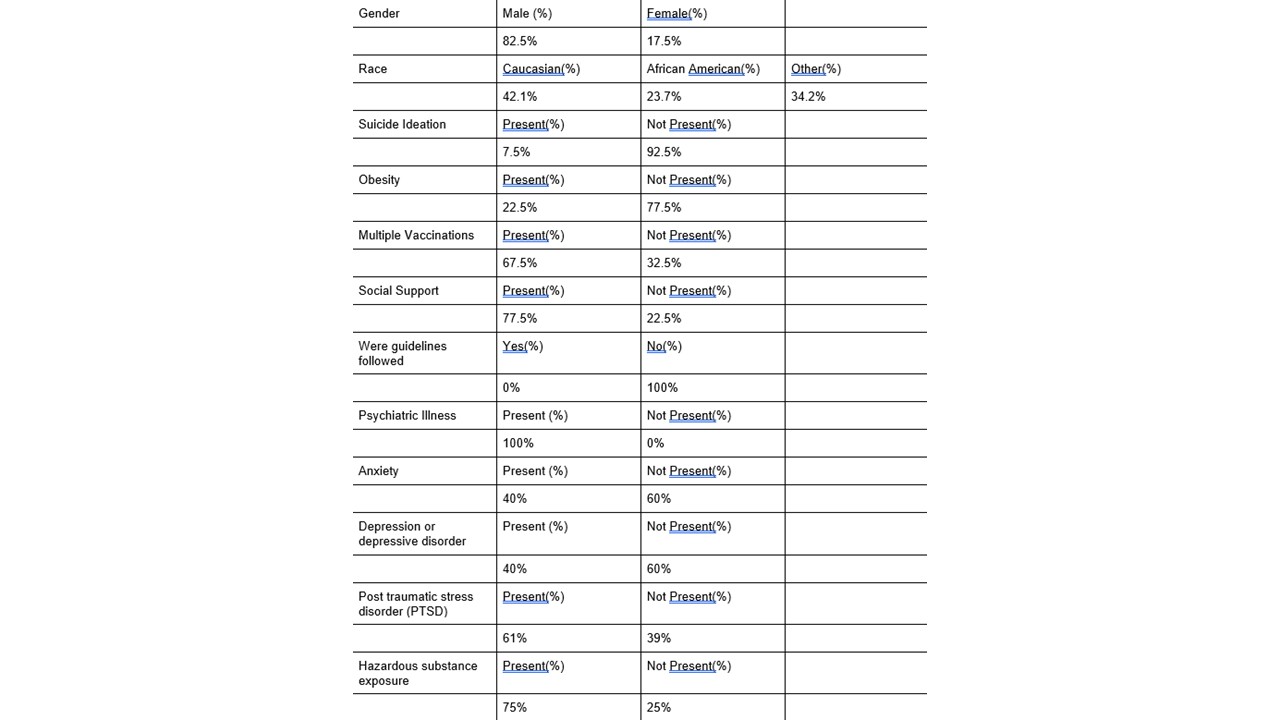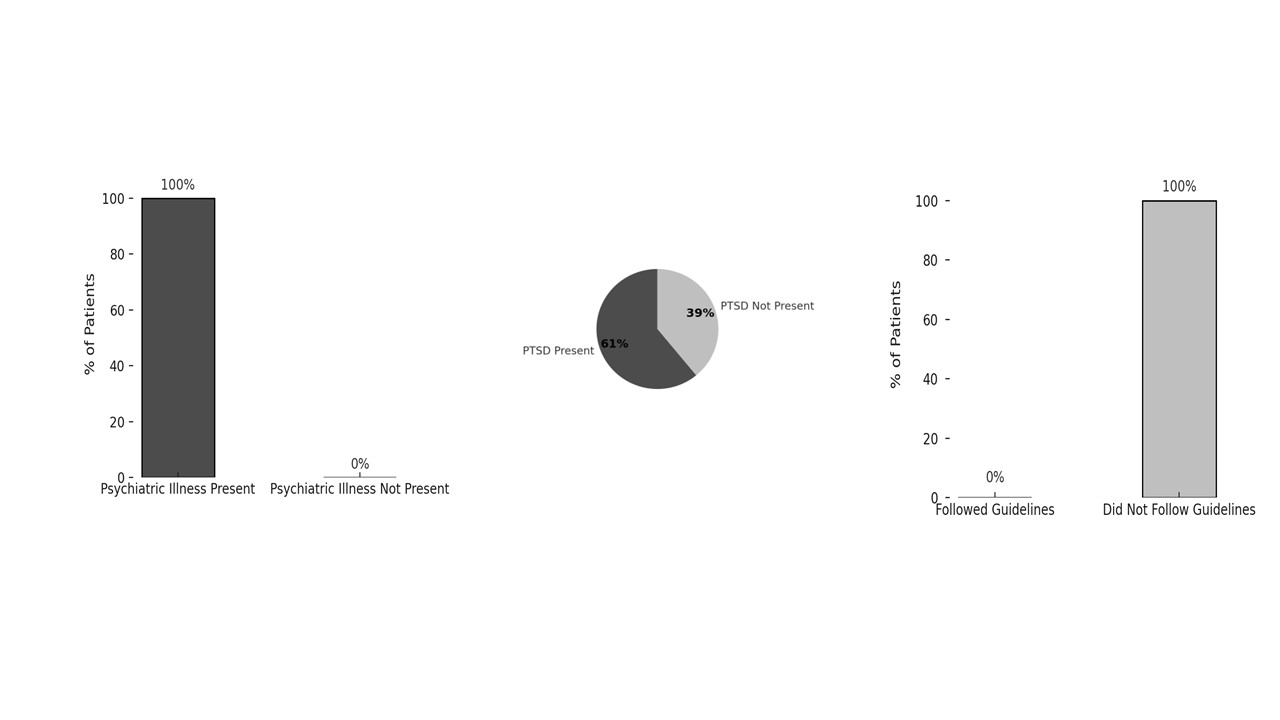Tuesday Poster Session
Category: Functional Bowel Disease
P5077 - Retrospective Cohort Study on Functional Gastrointestinal Illness (FGI) in Gulf War Veterans (GWV): Associations With PTSD Suicide Risk and Provider Compliance With Guidelines
Tuesday, October 28, 2025
10:30 AM - 4:00 PM PDT
Location: Exhibit Hall
- SM
Suhaas R. Mandala, MD (he/him/his)
James A. Haley Veterans' Hospital
Tampa, FL
Presenting Author(s)
Suhaas R. Mandala, MD1, Roshan Warman, MD2, Anna Pyayt, PhD3, Jose Lezama, MD1, Niketa Patel, PhD1, Jacob Lindheimer, MD1, Rahul Mhaskar, MD1, HariOm Yadav, PhD3, Shalini Jain, PhD3, Stephens Kyle, MD1, Philip Foulis, MD1, Yordan A. Urrutia, MD4, Gitanjali Vidyarthi, MD1
1James A. Haley Veterans' Hospital, Tampa, FL; 2Perelman School of Medicine at the University of Pennsylvania, Tampa, FL; 3University of South Florida, Tampa, FL; 4University of South Florida Morsani College of Medicine, Tampa, FL
Introduction: Following deployment to Operations Desert Storm and Desert Shield (1990-91 Gulf War), approximately 35% of about 767,000 returning US veterans began reporting multiple chronic and debilitating symptoms. This condition now widely recognized as Gulf War illness (GWI) includes a functional gastrointestinal illness (FGI) as a core symptom. Despite having similar features to irritable bowel syndrome (IBS) the cause of this illness remains unknown and has no cure. Despite significantly impacting quality of life and increased healthcare utilization given lack of understanding it is treated empirically in the shadows of IBS.
Currently research in this population is limited and crippled with poor quality.
There is a critical need to elucidate mechanisms behind these conditions and Veterans Health Administration called for comprehensive research in patients with FGI in GWI. We undertook the study to study the association between FGI disorders in Gulf War veterans (GWV) and over 50 variables including PTSD, suicide risk, provider adherence to clinical guidelines.
Methods: We performed a retrospective cohort analysis of 40 GWV diagnosed with FGI over a 10-year period from 2014-2024. Inclusion criteria were GWV diagnosed with FGI selected by ICD codes, and exclusion of organic GI pathology. Key variables analyzed were comorbidities, particularly PTSD suicide risk, depression, anxiety, multiple vaccinations, homelessness, sleep disturbance, combat exposure such as depleted uranium, diesel fumes. We also studied provider adherence to established clinical guidelines for FGI.
Results: Of all the variables studied analysis revealed all patients with a psychiatric Illness and significant association between FGI and PTSD (p< 0.001). Suicide risk and ideation was elevated at 7.5% compared to general population at 4.3%. It was also disconcerting that provider adherence to evidence-based guidelines was nonexistent at 0%.
Discussion: This study highlights the critical association of FGI in G WV in relation to psychiatry comorbidities such as PTSD, suicide risk suggesting a potential interplay of gut brain axis and underscoring the need for further investigation. We also observe lack of provider adherence to clinical guidelines further exacerbating the burden of this condition. In alignment with these research priorities, we are currently undertaking a larger study (a) leveraging artificial intelligence to understand etiological patterns and (b) enhancing provided education to improve patient outcomes.

Figure: FGI - Patient Summary Statistics Table

Figure: Psychological Comorbidities associated with FGI and provider compliance with guidelines.
Disclosures:
Suhaas Mandala indicated no relevant financial relationships.
Roshan Warman indicated no relevant financial relationships.
Anna Pyayt indicated no relevant financial relationships.
Jose Lezama indicated no relevant financial relationships.
Niketa Patel indicated no relevant financial relationships.
Jacob Lindheimer indicated no relevant financial relationships.
Rahul Mhaskar indicated no relevant financial relationships.
HariOm Yadav indicated no relevant financial relationships.
Shalini Jain indicated no relevant financial relationships.
Stephens Kyle indicated no relevant financial relationships.
Philip Foulis indicated no relevant financial relationships.
Yordan Urrutia indicated no relevant financial relationships.
Gitanjali Vidyarthi indicated no relevant financial relationships.
Suhaas R. Mandala, MD1, Roshan Warman, MD2, Anna Pyayt, PhD3, Jose Lezama, MD1, Niketa Patel, PhD1, Jacob Lindheimer, MD1, Rahul Mhaskar, MD1, HariOm Yadav, PhD3, Shalini Jain, PhD3, Stephens Kyle, MD1, Philip Foulis, MD1, Yordan A. Urrutia, MD4, Gitanjali Vidyarthi, MD1. P5077 - Retrospective Cohort Study on Functional Gastrointestinal Illness (FGI) in Gulf War Veterans (GWV): Associations With PTSD Suicide Risk and Provider Compliance With Guidelines, ACG 2025 Annual Scientific Meeting Abstracts. Phoenix, AZ: American College of Gastroenterology.
1James A. Haley Veterans' Hospital, Tampa, FL; 2Perelman School of Medicine at the University of Pennsylvania, Tampa, FL; 3University of South Florida, Tampa, FL; 4University of South Florida Morsani College of Medicine, Tampa, FL
Introduction: Following deployment to Operations Desert Storm and Desert Shield (1990-91 Gulf War), approximately 35% of about 767,000 returning US veterans began reporting multiple chronic and debilitating symptoms. This condition now widely recognized as Gulf War illness (GWI) includes a functional gastrointestinal illness (FGI) as a core symptom. Despite having similar features to irritable bowel syndrome (IBS) the cause of this illness remains unknown and has no cure. Despite significantly impacting quality of life and increased healthcare utilization given lack of understanding it is treated empirically in the shadows of IBS.
Currently research in this population is limited and crippled with poor quality.
There is a critical need to elucidate mechanisms behind these conditions and Veterans Health Administration called for comprehensive research in patients with FGI in GWI. We undertook the study to study the association between FGI disorders in Gulf War veterans (GWV) and over 50 variables including PTSD, suicide risk, provider adherence to clinical guidelines.
Methods: We performed a retrospective cohort analysis of 40 GWV diagnosed with FGI over a 10-year period from 2014-2024. Inclusion criteria were GWV diagnosed with FGI selected by ICD codes, and exclusion of organic GI pathology. Key variables analyzed were comorbidities, particularly PTSD suicide risk, depression, anxiety, multiple vaccinations, homelessness, sleep disturbance, combat exposure such as depleted uranium, diesel fumes. We also studied provider adherence to established clinical guidelines for FGI.
Results: Of all the variables studied analysis revealed all patients with a psychiatric Illness and significant association between FGI and PTSD (p< 0.001). Suicide risk and ideation was elevated at 7.5% compared to general population at 4.3%. It was also disconcerting that provider adherence to evidence-based guidelines was nonexistent at 0%.
Discussion: This study highlights the critical association of FGI in G WV in relation to psychiatry comorbidities such as PTSD, suicide risk suggesting a potential interplay of gut brain axis and underscoring the need for further investigation. We also observe lack of provider adherence to clinical guidelines further exacerbating the burden of this condition. In alignment with these research priorities, we are currently undertaking a larger study (a) leveraging artificial intelligence to understand etiological patterns and (b) enhancing provided education to improve patient outcomes.

Figure: FGI - Patient Summary Statistics Table

Figure: Psychological Comorbidities associated with FGI and provider compliance with guidelines.
Disclosures:
Suhaas Mandala indicated no relevant financial relationships.
Roshan Warman indicated no relevant financial relationships.
Anna Pyayt indicated no relevant financial relationships.
Jose Lezama indicated no relevant financial relationships.
Niketa Patel indicated no relevant financial relationships.
Jacob Lindheimer indicated no relevant financial relationships.
Rahul Mhaskar indicated no relevant financial relationships.
HariOm Yadav indicated no relevant financial relationships.
Shalini Jain indicated no relevant financial relationships.
Stephens Kyle indicated no relevant financial relationships.
Philip Foulis indicated no relevant financial relationships.
Yordan Urrutia indicated no relevant financial relationships.
Gitanjali Vidyarthi indicated no relevant financial relationships.
Suhaas R. Mandala, MD1, Roshan Warman, MD2, Anna Pyayt, PhD3, Jose Lezama, MD1, Niketa Patel, PhD1, Jacob Lindheimer, MD1, Rahul Mhaskar, MD1, HariOm Yadav, PhD3, Shalini Jain, PhD3, Stephens Kyle, MD1, Philip Foulis, MD1, Yordan A. Urrutia, MD4, Gitanjali Vidyarthi, MD1. P5077 - Retrospective Cohort Study on Functional Gastrointestinal Illness (FGI) in Gulf War Veterans (GWV): Associations With PTSD Suicide Risk and Provider Compliance With Guidelines, ACG 2025 Annual Scientific Meeting Abstracts. Phoenix, AZ: American College of Gastroenterology.
